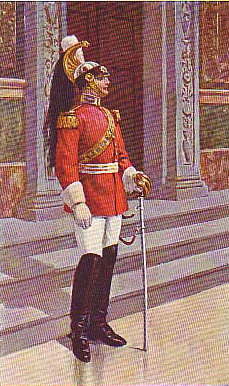
The Noble Guard (Italian: Guardia Nobile) was one of the household guard units serving the Pope. It was formed by Pope Pius VII in 1801 as a regiment of heavy cavalry. Conceived as the Pope’s personal guard, the unit provided a mounted escort for the Pope when he moved about Rome in his carriage and mounted guard outside his apartments in the papal palaces. The guardsmen were also available for special missions within the Papal States at the behest of the pope. One of their first major duties was to escort Pius VII to Paris for the coronation of Napoleon Bonaparte. Exclusively a palace guard, the Noble Guard saw no active military service or combat during the several military campaigns that engaged the Papal States between 1801 and 1870. With the unification of Italy and the abolition of the Papal States in 1870, the Noble Guard restricted its activity to the buildings and grounds of the Vatican. Though nominally still a cavalry unit, the unit had little opportunity to deploy on horseback in the limited confines of the Vatican, although two mounted troopers would accompany the papal carriage when the Pope was driven around the Vatican gardens. In 1904 mounted service was abolished entirely and the last horses were sold off. Originally armed with carbines, pistols and sabers, after 1870 the guardsmen carried only a saber.
The corps was always a volunteer one – its members were not paid for their service, although they received an allowance for their uniforms. Recruits were drawn from noble families in Rome, although in the twentieth century requirements were relaxed in practice to allow nobility from other regions of Italy to join the corps. The commander of the corps was called the Captain. One of the subordinate positions within the corps was that of Hereditary Standard-Bearer, who was responsible for carrying the standard of the Catholic Church.
After 1870, the Noble Guard, now reduced to a force of fewer than 70 men, performed mainly ceremonial duties as an honor guard. Guardsmen most commonly appeared in public when the pope presided over ceremonies in Saint Peter’s Basilica. When the pope was carried in the sedia gestatoria, Noble Guards walked alongside the papal chair. During the hours reserved for papal audiences, guardsmen also stood in the antechamber of the papal apartments and, on formal occasions, on either side of the papal throne. During the Second World War, the Noble Guard shared responsibility with the Swiss Guard for the personal security of Pope Pius XII. For the first time since 1870 pistols were issued to duty personnel. Throughout the war, Noble Guards mounted guard outside the papal apartment night and day and guardsmen followed Pius XII when he took his daily walks in the Vatican Gardens.
The guard was abolished by Pope Paul VI in 1970 as part of the reforms of the Church following Vatican II.